Research Description
After SARS-CoV2, tuberculosis (TB) is the world’s leading cause of death from an infectious agent with approximately 10.4 million new cases and 1.8 million deaths from TB each year. One-third of these new cases remain unknown to the health system, and many are not receiving proper treatment. With the advent of Covid-19, estimated TB mortality rates rose for the first time in a decade, a rise which is attributed to a reduction in access to diagnosis and care during the pandemic.
Our work focuses on improving TB outcomes through multi-disciplinary research. We focus on the development of new diagnostics for TB in children and for drug resistant disease, strategies for early detection, scaling up of preventive therapy, and the identification of risk factors for infection, disease progression and drug resistance. We work closely with partners in Peru where we have conducted large cohort studies in addition to collaborating with teams in India, Indonesia, Russia, and South Africa. Highlights of our most recent work include our studies of the contribution of host ancestry to TB risk in Peru, characterization of a novel class of T-cells associated with TB risk, the association of vitamin A deficiency and TB disease, the role of chest radiology in screening children exposed to TB, and the efficacy of all oral TB treatment regimens.
Research Projects
Integrated development and discovery of diagnostics for drug resistant tuberculosis
Description: Our long-term goal is to develop a diagnostic strategy that will improve the diagnosis of DR TB and stem the further spread of the disease.
Core Member(s): Megan Murray (PI), Molly Franke
Funder: NIH/NIAID CETR
Funding Number: U19 AI109755
Strengthening evidence on optimal multidrug-resistant tuberculosis treatment regimens through improved epidemiologic methods
Description: In the absence of clinical trial data, causal inference from observational multidrug-resistant tuberculosis (MDR-TB) cohort data is needed in order to generate robust evidence to guide MDR-TB treatment and care. We will conduct novel analyses on prospectively-collected longitudinal data, in order generate robust evidence to inform optimal care and treatment for MDR-TB globally.
Core Member(s): Molly Franke (PI), Letizia Trevisi
Funder: NIH/NIAID
Funding Number: R01 AI146095
Detection of transrenal Mycobacterium tuberculosis DNA in urine
Description: The goal of this project is to examine host and urine-related factors associated with detection of transrenal Mycobacterium tuberculosis DNA in adults with TB disease.
Core Member(s): Molly Franke (PI)
Funder: NIH/NIAID
Funding Number: R03 AI153554
Bacterial determinants of treatment response in Mycobacteria tuberculosis (BEAT-TB)
Description: This study will focus on the discovery of the genetic determinants of drug tolerance and resistance in mycobacteria tuberculosis both through mechanistic bench studies and through a genome wide association study of treatment failure in TB patients.
Core Member(s): Megan Murray (PI)
Funder: NIH/NIAID
Funding Number: U19 AI142793-03
Randomised trial of an intervention to increase tuberculosis notifications by private practitioners in Indonesia, plus sequencing and susceptibility sub studies
Description: This study will evaluate whether a tailored intervention package increases notifications of tuberculosis (TB) by private practitioners in Bandung, Indonesia.
Core Member(s): Megan Murray (PI)
Funder: CRDF Global u/d USDA
Funding Number: DAA3-19-64909-2
Are TB neighbourhoods a high risk population for active intervention?
Description: This research project aims to confirm whether neighbourhoods of TB cases in Indonesia constitute a high TB prevalence and incidence subpopulation for targeted intervention.
Core Member(s): Megan Murray (PI)
Funder: CRDF Global u/d NSF
Funding Number: OISE–9531011
Closing the gaps in TB care cascade (CGC)
Description: The project aims to provide novel, relevant, and rapid insights to prototype interventions, demonstrate successful models that will contribute to significant reduction of care cascade gaps while simultaneously strengthening health systems.
Core Member(s): Megan Murray (PI)
Funder: SAR Cellulabs u/d USAID
Funding Number: 72038620CA0012
Metabolic factors that control the spectrum of human tuberculosis
Description: This consortium project focused on the link between host immune and metabolic factors and their impact on progression and persistence of tuberculosis. Teams focused on human subjects, bio-informatics, and metabolomics work in parallel to identify targets including pathways linking human metabolism and immune response, T cells involved in Mtb response, pathogen determinants of drug resistance and pathogen-shed markers of clinical TB phenotypes. Each project included validation of these targets in the guinea pig model.
Core Member(s): Megan Murray (Co-PI)
Funder: NIH/NIAID TBRU
Funding Number: U19AI111224
Integrated discovery and development of innovative TB diagnostics
Description: Through this NIH funding, we worked to develop new diagnostics for drug resistant and pediatric tuberculosis.
Core Member(s): Megan Murray (PI)
Funder: NIH/NIAID CETR
Funding Number: U19AI109755
Epidemiology and transmission dynamics of MDR/XDR tuberculosis
Description: The Lima “Epi” project. This was a longitudinal study of approximately 18,000 people to study the bacterial and host determinants of TB infection and disease progression. Although we completed the study some years ago, we are still using data and samples collected in this study to explore nutritional, genetic and microbial contributions to disease.
Core Member(s): Megan Murray (PI)
Funder: NIH/NIAID
Funding Number: U19 A1076217
